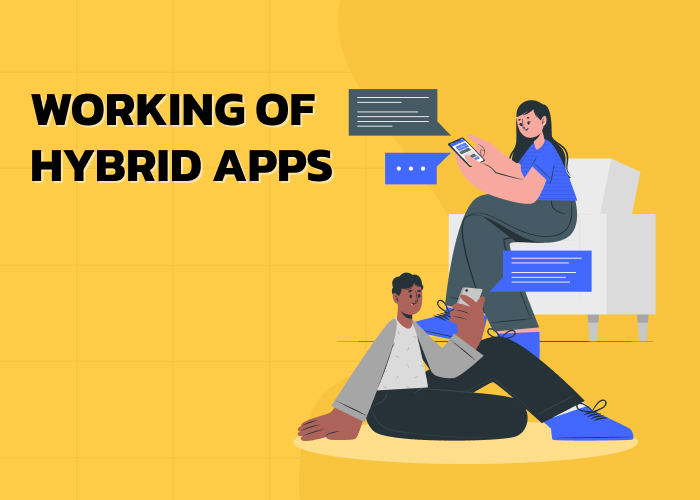Introduction to hybrid app development
It is a combination of native and web app development solutions. The hybrid apps are deployed on app stores or web platforms from where users can install them on mobile phones.
Thanks to WebKit, which is utilized by platforms, hybrid mobile apps operate both inside native apps and have their own embedded browsers. For instance, WebView is used by Android, and WKWebView is used by iOS to show a hybrid app.
Though hybrid app development services are quick and cost-effective, the apps are unable to deliver a high-quality user experience. With the help of code-shareability, hybrid app developers can develop apps in less time saving finances but can’t provide UX similar to a native app. By hiring expert app developers, you can launch hybrid apps that can deliver a close native UX.
Working of Hybrid Apps

Hybrid apps work slightly differently than web apps. As they are installed in the device similar to native apps, they feel similar. However, the native API in hybrid apps is connected to various mobile functionalities and to access the device’s hardware, it utilizes the browser engine.
Furthermore, it depends on the application if it can be used offline or not. They are also integrated with the services that are web-based. However, an app that is hybrid has new, cutting-edge capabilities that aren’t accessible for many platforms or OS. Additionally, hybrid app development may not even include some native app development functionalities.
Advantages of hiring a hybrid app development company
- The expertise of hybrid mobile app development companies can lead to efficient development and fruitful results.
- Furthermore, you can work with talent having expertise in design and development. Thus, you don’t have to find a designer, developer, team manager, etc. You can directly hire a dedicated development team from the company.
- An experienced app development company will help you to get into the market quickly while maintaining the app quality. Furthermore, you can scale your app whenever required with the help of them.
- Additionally, you can get post-launch support and maintenance services from the company. This involves fixing any problems that turn up once the app launches, installing updates, and making sure the program is still compatible with the newest iterations of operating systems.
- Project managers are frequently employed by companies to supervise the development process and guarantee that the project remains within budget and time. An efficient project management process is essential to the app’s overall success.
Frameworks to use for developing hybrid apps
Below are the frameworks that you can consider for developing hybrid apps.
- Ionic: It is an open-source SDK to develop hybrid mobile apps. It offers services and tools for creating hybrid mobile apps with web technologies including Javascript, HTML, and CSS. By utilizing Cordova, apps developed with these Web technologies may be delivered via native app stores and downloaded on devices. The Ionicons icon pack, which contains hundreds of the most popular app icons, is part of the framework. Additionally, you may create your apps with Live Reload. Additional helpful features include a custom animation API, AoT compilation, and deep linking.
- React Native: Renowned hybrid app framework React Native leverages React to create cross-platform and hybrid mobile applications. This framework was made available by Facebook in 2015. User interface components in React JSX are connected to native code and built for numerous platforms.
- NativeScript: NativeScript applications, which were first developed by Progress, may be constructed with JavaScript or any other language that translates to JavaScript, such as TypeScript. This hybrid app framework offers extensive interoperability with current Angular versions. NativeScript-built mobile apps, on the other hand, are really native apps that utilize the same APIs as those created using Xcode or Android Studio. This implies that native performance and a platform-native user interface are yours without WebViews.
Conclusion
The process of developing hybrid apps combines aspects of web and native applications. It entails combining web technologies like HTML, CSS, and JavaScript to create a single codebase that can be implemented on several platforms, including iOS and Android.
Businesses may strike a balance between accessibility to native device capabilities, compatibility with multiple platforms, and cost-effectiveness through the development process.
Furthermore, selecting a proficient hybrid app development company may augment these advantages by offering proficiency, entry to a professional talent pool, and a simplified development procedure.
FAQs
What is hybrid mobile app development?
How to develop hybrid app?
What is the difference between native and hybrid apps?
Can hybrid apps access native device features?
Can hybrid apps work offline?
Ravi Bhojani is the Chief Marketing Officer (CMO) at Alian Software, where he spearheads the company’s marketing strategies and drives its brand presence in the competitive IT services landscape. With over a decade of experience in the technology and marketing sectors, Ravi has consistently demonstrated his ability to blend innovative marketing techniques with deep industry knowledge to deliver outstanding results.